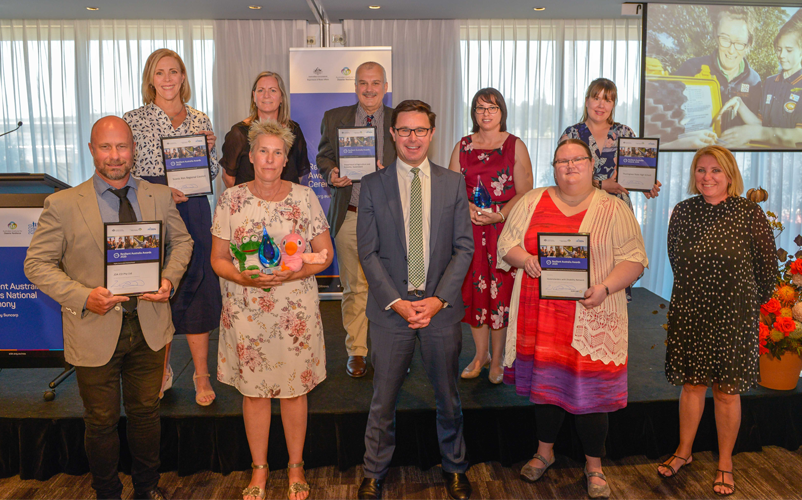The 21st Resilient Australia Awards celebrated initiatives that built stronger connections and hazard awareness within communities to build their capacity before, during and after disaster.
In a year that saw widespread and intense bushfires across much of Australia’s landscape, compounded by the local and global effects of pandemic and the declaration of a La Niña season anticipated to bring increased storm and flooding hazard, the need for – and public awareness of – disaster resilience has been amplified.
This was reflected in the record number of submissions to the Resilient Australia Awards program in 2020, with 35 national finalists selected from a total of 173 submissions across 6 categories: business, community, government, local government, schools and photography.
Federal Minister for Agriculture, Drought and Emergency Management The Hon. David Littleproud MP attended the event to present the awards to the winning and highly commended projects. 'By celebrating innovation and best practice, these awards showcase work that is often unrecognised, inspiring others to think about how they can be more disaster resilient,' he said.
In her address at the awards ceremony, Australian Institute for Disaster Resilience Executive Director Amanda Leck acknowledged the many creative and adaptive responses to the challenges of 2020, and the importance of sharing, celebrating and building upon these achievements.
‘Australians have proved themselves to be resilient in the face of adversity - but we are not unbreakable. Which is why we continue to celebrate the Resilient Australia Awards.
‘Our work is never done, so it’s important we seize these moments to encourage each other and to share successes. To renew our resolve to keep working towards safer communities,' she said.
National Award: Building resilience with children, on farms, into homes
In 2011, clinicians at the Queensland Centre of Perinatal and Infant Mental Health (QCPIMH) noticed a sharp increase in babies and young children presenting with anxiety and other emotional and behavioural disturbances. These symptoms appeared linked to the tropical cyclone and widespread catastrophic flooding that affected three-quarters of Queensland that year.
In response, QCPIMH developed Birdie's Tree, a suite of colourful, child-friendly resources to help families prepare for, cope with and recover from such events. Launched in November 2018, the Birdie’s Tree universal resources include more than 8 storybooks that follow characters Birdie and Mr Frog as they cope with various hazard events.
Complementary online games help children learn about natural hazards, emergencies and explore the ‘big feelings’ that go with these situations. Parents, teachers, carers, emergency responders and health professionals can get more support through information and resources linked to the website.
To ensure the Birdie’s Tree resources are suitable for Queensland’s diverse population, a number of the Birdie’s Tree books can be read online in different languages, and the website provides links to culturally appropriate resources for Aboriginal and Torres Strait Islander families. Two Birdie storybooks, ‘Birdie and the Big Sickness’ and ‘Birdie and the Virus’, have video Auslan translations to help support the resilience of young children who are Deaf or hard of hearing in the context of the COVID-19 pandemic.
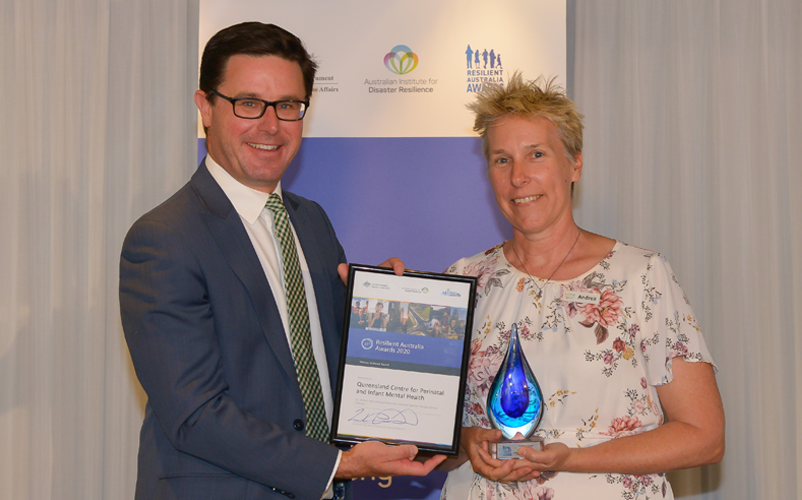
Minister Littleproud presented Andrea Baldwin (on behalf of the Queensland Centre for Perinatal and Infant Mental Health) with the Resilient Australia National Award for the ‘Birdie’s Tree’ children’s storybooks and resources.
Image: Gary Hooker
Birdie’s Tree resources have been used in 374 community events, leading to a total of 5649 people across the age range being screened for mental health issues and 530 receiving mental health treatment and support.
The Birdie’s Tree project was awarded the 2020 National Resilient Australia Award for providing resources that help children to process their experience and emotions during disaster and provide them with the tools to communicate their feelings with others. The resources can and have been used to support children in other locations, with 34,000 new users during the Black Summer bushfires and 31,000 users accessing the site in May from across all Australian states and territories.
Another 2 Queensland initiatives were highly commended in the National Resilient Australia Award category, one for empowering farmers to better manage drought and climate risk, the other for building flood resilience.
Farming in Australia's most disaster-prone state and managing one of the world's highest variable rainfall areas is a daily challenge for Queensland farmers. The Queensland Department of Agriculture and Fisheries developed the Drought and Climate Adaption Program (DCAP) to support those working on the land through improved seasonal forecast products, tools and on-property activities. Climate scientists, government and non-government agencies, farmers and industry leaders are working together on a number of cutting-edge projects targeting the grazing, cropping, sugarcane and horticulture industries.
DCAP was borne out of the need to build the resilience and capacity of farmers and their agribusinesses to drought and climate risks. Increasing resilience at the farm level can apply more broadly to rural and remote communities in which they are located. Significantly, over 770 primary producers indicated that some practice change has occurred in their enterprise as a result of using DCAP projects.
Almost 10 years ago, architecture firm JDA Co Pty Ltd began the Building Australia's Flood Resilience initiative. It began as pro-bono grassroots action in the wake of extensive floods in Queensland in 2011, providing building assessments for uninsured homeowners and coordinating 60 architects and 100 students to record damage in 250 assessments.
The firm approached their work with a focus on ‘learning through doing’ and offered advice to homeowners on how to build back better while observing how building materials react to floodwater, and importantly, how much of an adverse effect such an event has on people.
Since then, the initiative has grown into work for government, non-government, industry and academic clients. This includes a community ‘build back better’ program, designing a number of flood resilient private homes, writing the Queensland Government residential flood resilience guide, designing the Flood Resilient Homes Program for Brisbane City Council, writing the flood resilience guides for the City of Gold Coast and successfully lobbing the insurance industry to recognise flood resilient design and lower their clients’ insurance premiums accordingly.
ABC Emergency was also recognised at the awards ceremony for their outstanding contribution to national resilience. The ABC’s role as an emergency broadcaster was critical during the 2019–20 bushfire season, with ABC Local Radio teams providing emergency broadcasting for more than 950 incidents – a threefold increase on previous years. In 2020, The ABC also delivered more than 3000 emergency broadcasts related to the COVID-19 pandemic.
Suncorp National Community Award: Planning for individual needs and nourishing communities
While autism is currently indicated by the World Health Organization as 1:68 of the population, A literature search indicated that there was little to no research into the needs of people with autism in relation to disasters.
The Ask Me What I Need project from Next Step Inc was initiated to fill this gap and provide awareness, acknowledgement and acceptance of the needs of people with autism when in an emergency.
With funding from the Natural Disaster Resilience Program through the Office of Emergency Management NSW Justice Community Resilience Innovation Program, a 5-minute austism awareness training video for emergency services organisations was developed to provide basic strategies for their personnel to implement when dealing with youth and adults who identify as autistic.
It is the first project to address these needs in relation to management planning and was awarded the 2020 Suncorp Resilient Australia National Community Award, sponsored by Suncorp.
As the project’s title suggests, Ask Me What I Need reflects that each person is an individual and has individual needs depending on their circumstances.
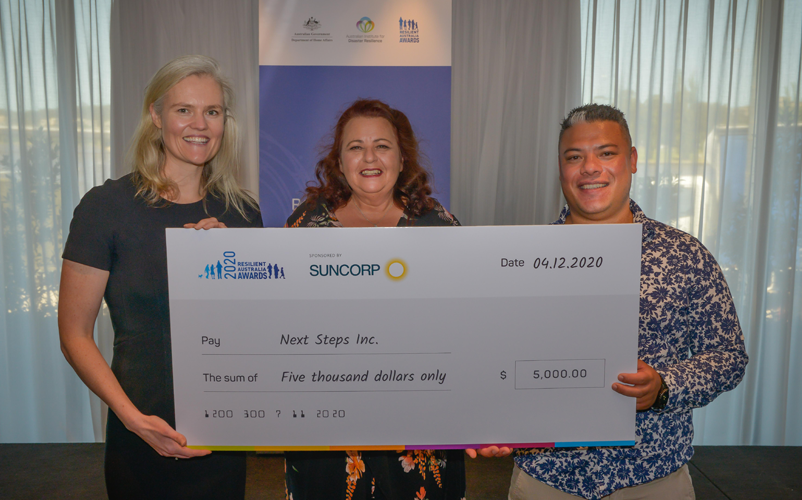
Suncorp CEO Lisa Harrison presents the winners of the Suncorp Resilient Australia Community Award, Berinda Karp and Richard Eifler of Next Step Inc., with a $5,000 prize from Suncorp for their autism awareness project, ‘Ask Me What I Need’.
Image: Gary Hooker
Another disability-inclusive project was highly commended in the Suncorp Resilient Australia National Community Award. The Queenslanders with Disability Network partnered with the University of Sydney and the Queensland Government to launch Person-Centred Emergency Preparedness Planning for COVID-19.
This planning guide has practical tools and information to assist people with disability and those who support them to make a plan for their individual needs and situation during the COVID-19 pandemic, redressing the exclusion that people with disability have experienced in accessing emergency information.
The project was co-led by people with disability and the planning guide has been endorsed as part of the Department of Health’s national response to COVID-19 for people with disability.
The other highly commended project was the Bendigo Foodshare (BFS) Rescue, Grow, Cook and Share project, a partnership across businesses, volunteers and community groups to reduce food poverty. The project is community owned, volunteer-based and operates on the value of empowerment, not dependence.
With a 40 per cent increase in demand for food due to the COVID-19 pandemic, BFS recruited an additional 246 volunteers and worked with local supermarkets and donors to increase food rescued from 25,000 to 46,000 kgs per month.
Meals and food were distributed through 87 agencies to assist 12,800 people doing it tough every week, and the online Bendigo Community Pantry assisted in reducing stigma and improving access to food relief.
BFS believes a whole-of-community problem requires a whole-of-community response, and credits the broad, deep and active partnerships across their community for their ability to quickly engage in response to a crisis.
Local Government Award: Rising above flood impacts, providing food for thought
On the evening of 10 May 2018, Hobart recorded 128 millimetres of rain, double the previous May record. The subsequent flood inundated homes, businesses and community hubs, swept cars away and cut power to many locations. This event become known as Southern Tasmania Extreme Weather Event (STEWE).
In response, the City of Hobart's 'Resilient Hobart' project was established to deliver 5 initiatives to meet the recovery and resilience needs of the community. The project provided an opportunity to hear and learn from experiences, equip community leaders with skills support their communities now and into the future, and acknowledge the resilience of people directly and indirectly affected by this extreme weather event.
Resilient Hobart was awarded the 2020 National Resilient Australia Local Government Award for its efforts that spanned stories of resilience, a community resilience assessment pilot project, public artworks, creative recovery for family and children and Australian Red Cross Workshops for community organisations and leaders.
Collectively, the initiatives gave voice to people in communities, increased communication skills, assisted children to process emotions, and shared stories and art that acknowledge the event and inspire reflection on the need for preparedness and resilience.
Since STEWE, there have been 2 subsequent emergency events; the Huon Valley Fires in January 2019 and the COVID-19 pandemic in 2020. The shared responsibility for recovery from STEWE has strengthened relationships and increased the sharing of knowledge, skills and resources among southern Tasmanian councils.
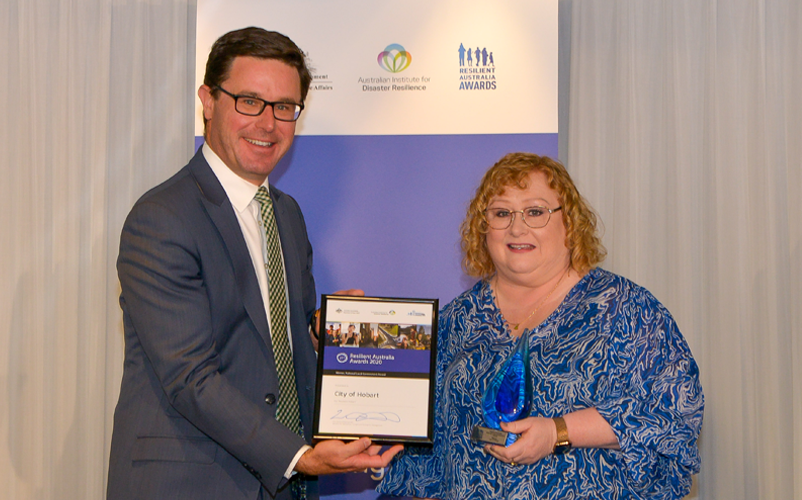
Kimbra Parker accepted the Resilient Australia Local Government Award from Minister Littleproud on behalf of the City of Hobart for its project ‘Resilient Hobart'.
Image: Gary Hooker
In March 2020, at the height of the pandemic, a fire destroyed the only supermarket and hardware store in Bruce Rocks, Western Australia. With many community members self-isolating and in need of supplies close to home, the council and community acted swiftly to establish the Bruce Rocks Community Supermarket in the Shire Hall. This activity was another of the highly commended projects in the Resilient Australia Local Government Award category.
Working around COVID-19 pandemic restrictions, food and equipment was purchased and donations and volunteer labour were coordinated. Vegetable boxes were dropped to residents only days after the fire and the store was open for business within a week.
Bruce Rocks Community Supermarket project has reminded the community of their strength, and boosted confidence that they can operate on a business as usual basis, even when they are dealing with multiple events.
Food was the focus of the other highly commended project in the Resilient Australia Local Government Award category. When COVID-19 pandemic restrictions interrupted food festivals and day trips, local producers from the Scenic Rim region sent their food to customers' doors through the Scenic Rim Farm Box initiative, supported by the Scenic Rim Regional Council.
In the first 3 weeks the venture had dispatched over 1100 boxes to customers throughout southeast Queensland. In the first 7 weeks over 2000 boxes were sold at an average of $140 per box, amounting to over $280,000 in revenue.
The economic boost delivered through the Scenic Rim Farm Box was welcomed after the devastating bushfires and drought conditions in 2019 and flooding that had altered transport routes during 2020.
Photography Award: Capturing family strength and sacrifice, and commitment to service
As COVID-19 pandemic restrictions closed borders and isolated families, photographer Nikki Woods travelled from driveway to driveway in Gingin, Western Australia to capture what families were doing during this strange time, and to spread some laughs and smiles along the way.
Her Resilient Australia Photography Award winning image captured the Todd family and their dog in their driveway ‘dressed to the nines’ as they enjoyed a cheese platter on the bonnet of their vintage car, pulled out of the shed especially for the occasion. As father and husband Leith works away from home, the family usually treat themselves to a night out for dinner when he returns. With everything closed due to the pandemic, the family recreated the experience in their driveway. The Todd family are just one of the many Gingin families that were involved in #thedrivewayproject.
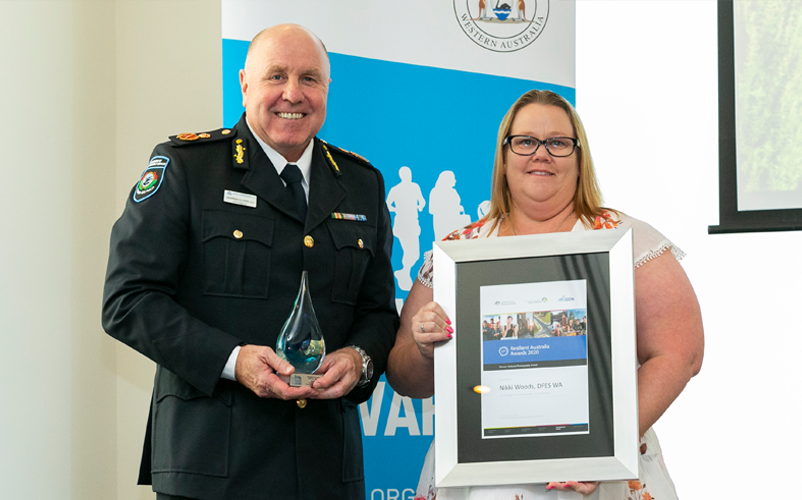
Department of Fire and Emergency Services WA Commissioner Darren Klemm presents Nikki Woods with the Resilient Australia National Photography Award for her image The Driveway Project. As a component of the award, the image features on the front cover of this edition of the Australian Journal of Emergency Management.
Image: DFES WA
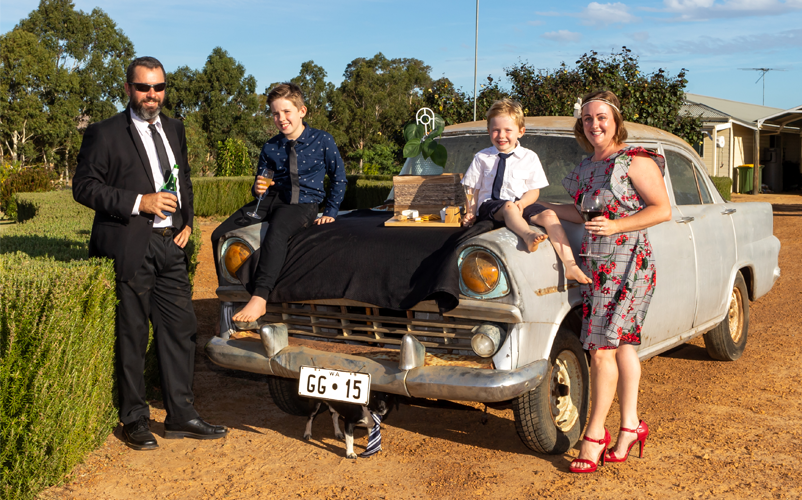
The Driveway Project - Winner, 2020 Resilient Australia National Photography Award.
Image: Nikki Woods
One of the most memorable and emotional images from the 2019–20 bushfire season was highly commended in the National Photography Award category. James Morris's image depicts then NSW Rural Fire Service Commissioner Shane Fitzsimmons pinning a Commissioner’s Commendation for Bravery badge to toddler Harvey Keaton’s shirt in memory of his father, Geoff Keaton, who was killed while undertaking firefighting operations in Sydney in December 2019. The heart-wrenching image captures the significant sacrifice and service of firefighters during a particularly dangerous and devastating bushfire season.
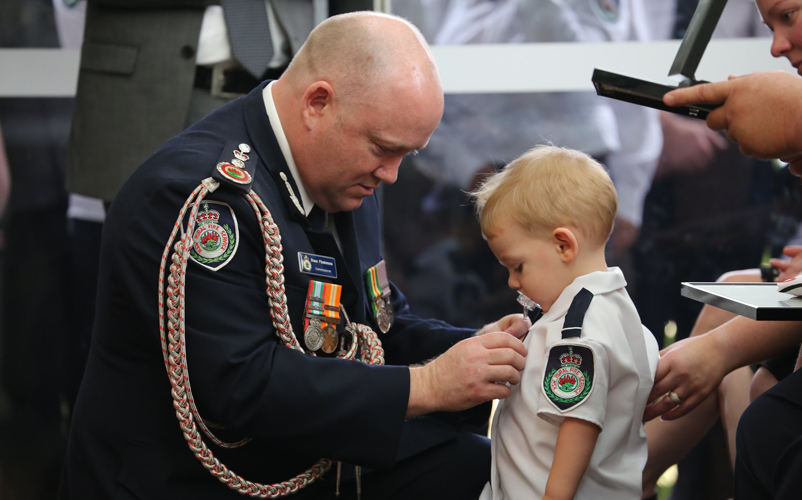
Toddler of hero father presented with bravery medal - Highly Commended, 2020 Resilient Australia National Photography Award.
Image: James Morris
The other highly commended image in the photography award was presented to Blair Horgan for the image ‘From a Different Angle’. The image captures a Tasmania State Emergency Service volunteer peering through a smashed car window during a joint training exercise with student doctors on dealing with mass causalities.
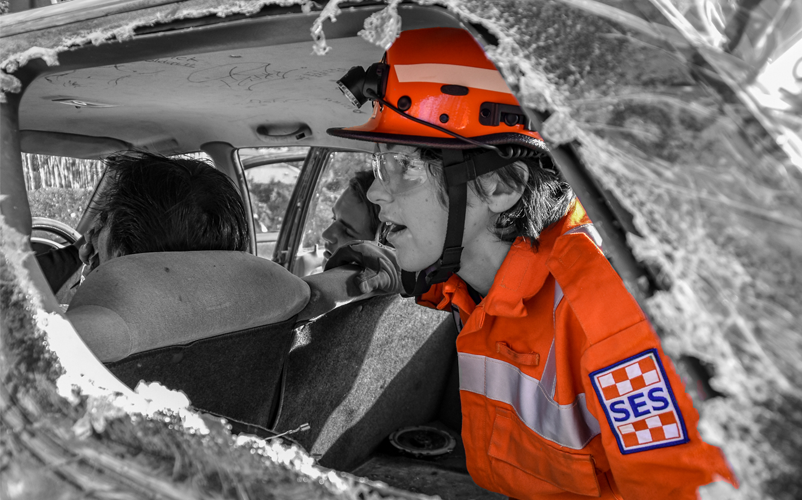
From a different angle - Highly Commended, 2020 Resilient Australia National Photography Award.
Image: Blair Horgan
School Award: Students find tech solutions, forge connections for resilience
Monsoon activity in North Queensland in 2019 created a significant flood event that closed schools and roads and forcing evacuations. Following this distressing incident, questions arose about the resilience of young Queenslanders and how they can better prepare for disasters and the effects of climate change.
Thuringowa State High School found one solution in technology, with the Disaster Resilience for a Changing Climate Grand Challenge course delivered through the school’s Queensland Virtual STEM Academy. The 10-week course for students in Years 5-9 is a virtual platform that connects like-minded students from different schools with university and industry experts. In collaboration with Townsville City Council, emergency managers and James Cook university, students developed resilience and community activities to help people be safe, seek assistance and help others before, during and after events.
To reflect the diversity of the people and hazard profiles in Queensland, the course focuses on a variety of hazards that are experienced across Queensland. Students use scientific inquiry and problem-solving skills and collaborate with each other and experts to solve the Grand Challenge. Importantly, 92 per cent of students indicated that the course improved their understanding of climate change and the need for resilience. The education project was awarded the 2020 National Resilient Australia School Award.
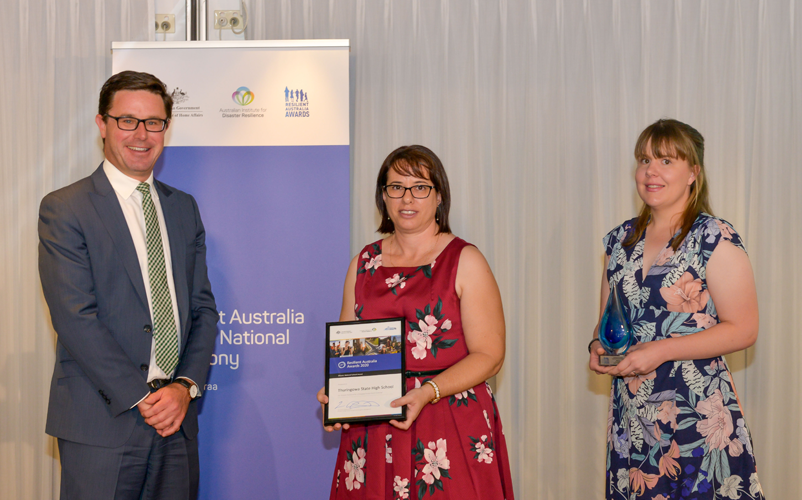
Minister Littleproud with Wendy Bode and Kaitlyn Hotz from Thuringowa State High School, who accepted the Resilient Australia School Award for the project 'Disaster Resilience for a Change Climate Grand Challenge'.
Image: Gary Hooker
The 2 highly commended projects in the school category were designed to introduce students to emergency service agencies and their personnel. This project boosted young people’s understanding of hazards and their possible roles and responsibilities before, during and after events.
Augusta Primary School’s pilot program ‘Exploring Emergency Services’ was a coordinated effort by the school and local emergency services to lead change in disaster resilience among youth and their families in Augusta, Western Australia. The program focused on increasing student understanding of local risks, emergency services resources and empowering students and their families to take responsibility for their actions, prepare and plan for emergencies. The program also inspired students to consider volunteering and increased social cohesion between students, families, primary school staff, community members and emergency services in the Augusta community.
A similar project at Timboon P-12 School in Victoria increased student awareness and experience of emergency services activity through the Timboon Agriculture Project. The initiative links the school to its local community, creating champions for effective school-industry engagement among its staff, families and community. In 2019, the annual celebration of the school’s curriculum focused on volunteering through the theme: Step Up!
Almost 500 students from Timboon and neighbouring Nullawarre Primary School were introduced to the gamut of volunteering in all sectors across our community. The expo was followed by age-tailored workshops for students and community visitors to continue this engagement and learning about the roles of emergency services volunteers and the training activities and technologies they use. The workshops and rescue scenarios reinforce the importance of community connections, demystify emergency personnel, build relationships based on trust and appreciation, and encourage new volunteers.
